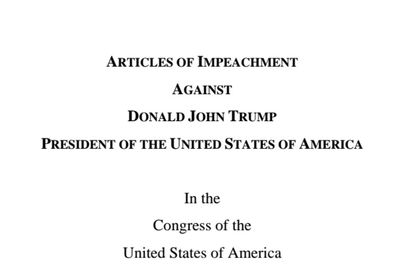There are good reasons to be wary of impeachment talk. Congressional Republicans show zero interest, and they're the ones in charge. Democrats, for their part, need to focus on retaking Congress, and railing about impeachment probably won't help them win votes.
But let's set aside realpolitik for a few minutes and ask a different question: Is serious consideration of impeachment fair? I think the answer is yes. The evidence is now quite strong that Donald Trump committed obstruction of justice. Many legal scholars believe a sitting president cannot be charged with a crime. So the proper remedy for a president credibly accused of obstructing justice is impeachment.
The first article of impeachment against Richard Nixon argued that he had "prevented, obstructed and impeded the administration of justice." One of the two impeachment articles that the House passed against Bill Clinton used that identical phrase. In both cases, the article then laid out the evidence with a numbered list. Nixon's version had nine items. Clinton's had seven. Each list was meant to show that the president had intentionally tried to subvert a federal investigation.
Given last week's news — that Trump has already tried to fire Robert Mueller, the special counsel investigating the Trump campaign — it's time to put together the same sort of list for Trump. Of course, this list is based only on publicly available information. Mueller, no doubt, knows more.
1. During a dinner at the White House on Jan. 27, 2017, Trump asked for a pledge of "loyalty" from James Comey, then the F.B.I. director, who was overseeing the investigation of the Trump campaign.
2. On Feb. 14, Trump directed several other officials to leave the Oval Office so he could speak privately with Comey. He then told Comey to "let this go," referring to the investigation of Michael Flynn, who had resigned the previous day as Trump's national security adviser.
3. On March 22, Trump directed several other officials to leave a White House briefing so he could speak privately with Daniel Coats, the director of national intelligence, and Mike Pompeo, the C.I.A. director. Trump asked them to persuade Comey to back off investigating Flynn.
4. In March and April, Trump told Comey in phone calls that he wanted Comey to lift the "cloud" of the investigation.
5. On May 9, Trump fired Comey as F.B.I. director. On May 10, Trump told Russian officials that the firing had "taken off" the "great pressure" of the Russia investigation. On May 11, he told NBC News that the firing was because of "this Russia thing."
6. On May 17, shortly after hearing that the Justice Department had appointed Mueller to take over the Russia investigation, Trump berated Jeff Sessions, the attorney general. The appointment had caused the administration again to lose control over the investigation, and Trump accused Sessions of "disloyalty."
7. In June, Trump explored several options to retake control. At one point, he ordered the firing of Mueller, before the White House counsel resisted.
8. On July 8, aboard Air Force One, Trump helped draft a false public statement for his son, Donald Trump Jr. The statement claimed that a 2016 meeting with a Russian lawyer was about adoption policy. Trump Jr. later acknowledged that the meeting was to discuss damaging information the Russian government had about Hillary Clinton.
9. On July 26, in a tweet, Trump called for the firing of Andrew McCabe, the F.B.I.'s deputy director, a potential corroborating witness for Comey's conversations with Trump. The tweet was part of Trump's efforts, discussed with White House aides, to discredit F.B.I. officials.
10. Throughout, Trump (and this quotation comes from the Nixon article of impeachment) "made false or misleading public statements for the purpose of deceiving the people of the United States." Among other things, Trump repeatedly made untruthful statements about American intelligence agencies' conclusions regarding Russia's role in the 2016 election.
Obstruction of justice depends on a person's intent — what legal experts often call "corrupt intent." This list is so damning because it reveals Trump's intent.
He has inserted himself into the details of a criminal investigation in ways that previous presidents rarely if ever did. (They left individual investigations to the attorney general.) And he has done so in ways that show he understands he's doing something wrong. He has cleared the room before trying to influence the investigation. He directed his son to lie, and he himself has lied.
When the framers were debating impeachment at the Constitutional Convention, George Mason asked: "Shall any man be above justice?"
The same question faces us now: Can a president use the power of his office to hold himself above the law? Trump is unlikely to face impeachment anytime soon, or perhaps anytime at all. But it's time for all of us — voters, members of Congress, Trump's own staff — to be honest about what he's done. He has obstructed justice.
He may not be finished doing so, either.
David Leonhardt, New York Times, January 28, 2018.
###
January 29, 2018
Post Script. Above is a sample Article of Impeachment. Now get registered and win in November to make this a reality.
